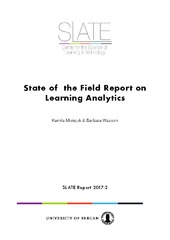| dc.description.abstract | Learning analytics is a young, rapidly growing field of research and practice. In this State of the Field study our goal was to conduct an objective and comprehensive review of learning analytics in order to summarise the field by answering the following questions: What are the main research themes within the field of learning analytics? What data and methods are being used? and What are the characteristics of the learning analytics studies? The combined proceedings of the Learning Analytics and Knowledge (LAK) conferences from 2011-2015 were used to generate a set of search terms for a systematic search for relevant articles. In collaboration with the Knowledge Centre for Education (Kunnskapssenter for Utdanning) our search produced 796 articles, which after a systematic reduction resulted in a corpus of 100 articles. A thematic analysis was carried out to identify the primary research themes that have emerged. These included: algorithms and models, data, predictive analysis, learning analytics for educators, learning analytics for institutions, network analysis, tool development, visualisations, overviews, text analysis, and ethics, philosophy & policy. An analysis of the corpus showed that learning analytics is a wide field with articles published in education, computer science, and psychology journals the research is data rich, but theory poor the majority of the research has been carried out in higher education predictive analysis is a very popular research area addressing HE institutional problems such as dropouts, retention, and curriculum issues predictive models/algorithms are situation dependent and there is little evidence that they are transferable between different contexts There are also a number of gaps in the research on learning analytics: the application of learning analytics in K-12 education (at macro, meso, micro levels) research on everyday analytics in classrooms (i.e., how do we collect data in classrooms) research on assessment/feedback research on learning-centric analytics, as opposed to learner-centric analytics Implementation and impact of learning analytics data literacy, although there are a few studies addressing whether or not stakeholders can understand the visualisations they are presented. | en_US |
